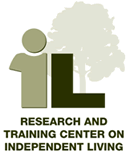Engaging Policymakers

University of Kansas (KU)
Research and Training Center on Independent Living (RTC/IL)
Submitted by Martha Hodgesmith and Val Renault
Focus
Encouraging direct information exchanges and collaborative partnerships between researchers and policymakers can be a key component of an effective KT strategy aimed at facilitating the uptake of relevant research findings in disability-related policy.
Context
The RTC/IL is based at the University of Kansas and is made up of a team committed to research aimed at enhancing independent living options for people with disabilities. The research-based information produced by RTC/IL can be used in a variety of ways to raise awareness and changes in behaviors and public policies. Staff provide training in the field, disseminate findings through conference presentations and peer-reviewed publications, share new information with policymakers for decision making, and create useful products for consumers and advocacy groups.
KT Activity
The RTC/IL staff planned a unique “Bridging Meeting” experience with a knowledge translation goal to influence policies affecting independent living. The meeting took place in the second project year, with the goal of involving stakeholders early in the research process rather than waiting to disseminate findings at the conclusion of project activities. Staff utilized a knowledge translation model used by the Canadian Institutes for Health Research called the “Best Brains Exchange” as well as a rapid delivery format adapted from KU research sharing sessions. This approach includes both researchers and policymakers in highly focused exchanges to target research that could/should influence public policy (from the researcher perspective) and be sensitive to political forces that influence the incorporation of research evidence into public policies (from the policymaker perspective).
The Bridging Meeting was hosted by RTC/IL researchers and included national policymakers, representatives of national IL organizations, independent living researchers and the Center's Scientific and Consumer Advisory Panel members as participants. The RTC/IL retained Ian Graham, PhD, an internationally known KT expert and champion, to facilitate the meeting. Dr. Graham led the “Best Brains Exchange” to address the following outcomes: (1) provide policymakers with an overview of the current evidence available on independent living that has implications for policy, including immediate advice from researchers related to policymakers’ questions and concerns, and (2) provide researchers with policymakers’ perspectives on their research and findings and its implications for policy revision/development. Presentations and conversations among researchers and policymakers were kept focused and concise to maximize interaction time.
Impact
The discussion between policymakers and researchers during the Bridging Meeting is helping the RTC/IL tailor the products of its research findings to be useful for policymakers with an interest in developing and implementing policies to maximize the independent living of people with disabilities as well as older adults (reflecting the mission of the Administration on Community Living, which was represented at the meeting). Currently, RTC/IL is preparing web-based informational products and position papers based on the issues that policymakers are poised to address in upcoming legislative sessions.
Lessons Learned
- Direct exchanges between researchers and policymakers break down communication barriers.
- Measuring increased awareness is best done in measuring changes in behavior such as increased communications.
- Partnering with other available university resources, such as the Schools of Journalism and Business, can be useful in planning and implementing knowledge translation strategies.
Contact Information
Research and Training Center on Independent Living
www.rtcil.org
University of Kansas
1000 Sunnyside Avenue, Room 4089
Lawrence, Kansas 66045 -7555
785 864-4095
785 864-5063 (fax)
marthah@ku.edu
vrenault@ku.edu
